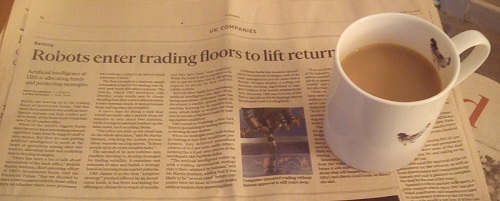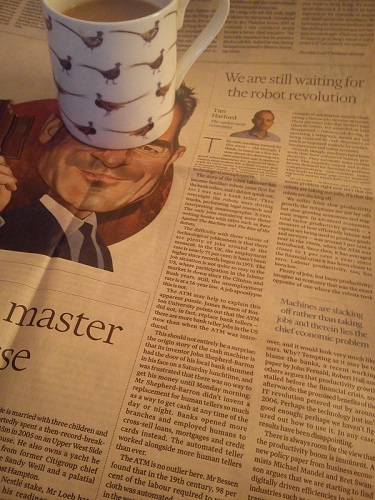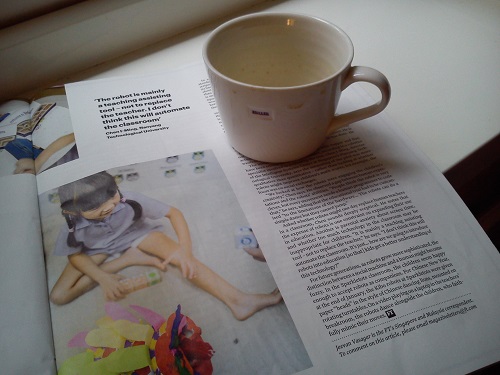This is a quick skim through some articles I read over the summer, mainly by economists, in which I explore three assumptions I think people make about computerised (digital) technology.
Digitalisation can replace humans.
Managers often think digitalisation can do human work for no
pay. (Except management work, I don’t think there are any managers who have
successfully replaced themselves with computers )
A bunch of Cambridge academics were pessimistic
about human employment in the face of increasing digitalisation. Noreena Hertz, ITV New's Economics Editor,
said: "owners of machines will do well. Those who are replaced by them,
won't." Cambridge
educated economists generally see a period of stagnation coming, as automation (among
other things) leads to lower employment in two ways: less jobs created, many of
those jobs at such a low level that people will not feel they are worth doing. Todd
Buchholtz, George W. Bush’s White House director of economic policy, added:
“We’re in a global race for IQ points, and whoever harnesses intelligence will
prosper most.” (Quoted in Marshall, 2017).

However
in an FT report on robots in the trading world (Martin and Noonan, 2017), Beatriz
Martín Jiménez says: “It frees people up to do more complex tasks.”

She adds that it will be “several years” before the robots are allowed to execute trades without human bankers first approving them. (The introduction of digitalisation ought to be done very slowly and with many checks.)
Tim Harford (2017) says: “machines have been tools
that enhanced human productivity. They automate some routine tasks. This
expands output and it also boosts demand for humans to perform complementary,
non-routine tasks. This leads to better pay, more interesting work and as many jobs
as ever overall.” It’s not automation that is leading to slow productivity, but
something else causing a logjam in the economy and a lack of jobs. Harford says
the only job that was ever done away with by automation was that of elevator
operators.

Of particular interest to me, as the Open University moves to increased digitilisation of our teaching, was an article about robots in the classroom. Those involved in this experiment are very clear that the robots are not supposed to replace human teachers, though. They want to offer kids good early familiarisation with technology in a world with more and more technology – you need humans to teach the kids how to do that.

Other mums often say
disparagingly to me that they will not buy their children iPads or iPhones,
regarding these as expensive exotic toys. We bought my daughter an iPad mini
when she was about 9. She was photographed with a group of other early digital
users at school; she is the only one holding her iPad properly. She learns a
huge amount from it, as she consumes lots of material off it – made by humans.
I can’t just leave her to it, though. I have to input to make sure her security
checks are up to date so she doesn’t download unsuitable material without
realising, and explain that just because ‘Pepper’ Potts goes out with a
billionaire, a girl who is a scientist doesn’t have to hang out at the Business
School looking for a boyfriend. (She can become an Open University lecturer )
Most of my daughter’s learning happens at a school staffed by humans, who generously give up their time to run science and digital leader clubs after lessons.
References
Arnold, Martin and Noonan, Laura (2017) “Robots enter trading floors to lift returns”. FT Weekend 8 July/9 July 2017, p.14.
Harford, Tim (2017) “We are still waiting for the robot revolution” FT Weekend 1 July/2 July, p.9.
Marshall, Alex (2017). “A New Normal: Forget everything you know about how the world works, this is the global economy, 3.0” in CAM, Cambridge Alumni Magazine. Issue 81, Easter 2017.
Vasagar, Jeevan (2017) “My First Robot”. FT Weekend Magazine, 15/16 July, pp.26-31.
Comments
New comment
Computers and digitisation is fantastic - as long as it works. Remember the adage that humans can create mess-ups but it takes a computer to create a total catastrophe. There is also this issue of cyber-crime. There needs to be a bit of due diligence involved in striding forward - many of us work without sophisticate help-desk backup or very much opportunity to develop competence [and confidence]. I am enthusiastic about these issues, but I am the one who has to resolve many issues with minimal support alanwNew comment
Interesting post Anita!
New comment
Thanks Emma
Thanks Alan I have heard that adage, although the version I heard was 'Tis human to err, but it takes a computer to make a complete b@llsup
I have heard that adage, although the version I heard was 'Tis human to err, but it takes a computer to make a complete b@llsup 
I am just working through the section of the module on open and closed systems, and starting to consider privacy online so plan to write more blogposts about that. Cybercrime is indeed a big and growing issue, and also trolling and hacking - sometimes done for amusement rather that money. As a Facebook user, I am often struck by the difficulties negotiating it - Facebook seems to have been set up in the belief that we would all want to share everything about ourselves, in order to hook up online with other like-minded people. The reality is far different and Facebook has had to work hard to adapt to that.